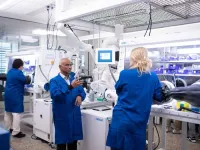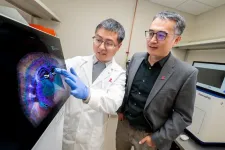(Press-News.org) Antibody treatment which activates the patient’s own immune system against cancer, known as immunotherapy, is increasingly being investigated as an alternative for chemotherapy and radiotherapy. This is because it specifically targets the cancer cells, which reduces the side effects seen with more conventional therapies.
Tumours, such as some breast and ovarian cancers, can express the marker HER2. HER2 is responsible for cancer growth and is the target of existing therapies, such as the most commonly used type of antibodies, IgG. However, this treatment is not always effective in some patients.
Now scientists have investigated a different antibody type, IgE, which activates the patient’s immune system in different ways to IgG. As they act on different immune cells to IgG, IgE antibodies uniquely stimulate otherwise inactive immune cells in the ‘microenvironment’ surrounding the tumour to directly target the cancer cells.
In the study, led by Dr Heather Bax at King’s College London, the team engineered IgE versions of existing IgG therapies, and tested their ability to activate immune cells against HER2-expressing cancer cells.
IgE was shown to direct immune cells against HER2-expressing cancer cells, and slowed tumour growth in mice. The tumours grown in mice are known to be resistant to conventional treatments, suggesting this new treatment could be an option for patients who don’t respond to existing therapy.
Further investigation revealed that IgE antibodies stimulated and reprogrammed the ‘immune microenvironment’ around the tumours themselves – shifting from an immunosuppressive to an immunostimulatory response. This means the immune system was activated to target the cancer cells, and to overcome the actions of the tumour to suppress attack.
The study, published in Journal for ImmunoTherapy of Cancer (JITC), with funding from Breast Cancer Now, has shown the potential of IgE as a new therapy for HER2-expressing cancers, including those resistant to other treatments. The researchers believe that, with the right investment and development, this approach could be used in humans in as soon as 3-5 years.
Senior Author Dr Heather Bax, Postdoctoral Research Fellow in St. John’s Institute of Dermatology, at King’s College London, said: “Around 20% of breast and ovarian cancers express the marker, HER2. By generating anti-HER2 IgE antibodies equivalent to the clinically used IgGs, for the first time we demonstrate that IgEs harness unique mechanisms to reprogramme the immune microenvironment, switching immune cells to effectively target HER2-expressing cancers, including those resistant to existing therapies.
“Our findings indicate that IgE antibodies could offer a potential new therapy option for patients with HER2-expressing cancer.”
Co-Author Professor Sophia Karagiannis, Professor of Translational Cancer Immunology and Immunotherapy, in St. John’s Institute of Dermatology, at King’s College London, added: “By generating a panel of IgE antibodies and studying them in different tumour types, we consistently found that the human immune system reacts in the presence of IgE to restrict the growth of cancer.
“The findings of our latest study speak to the potential of applying IgE to stimulate effective responses against hard-to-treat solid tumours. This new class of drugs holds promise to benefit different patient groups and opens a new frontier in the battle against cancer.”
Dr Kotryna Temcinaite, head of research communications and engagement at Breast Cancer Now, who provided funding for the study, said: “This exciting research could lead to much-needed new treatments for people with HER2 positive breast cancer whose cancers don’t respond to existing therapies. Now we know that the treatment works in principle in mice, researchers can continue to develop this immunotherapy to make it suitable for people, as well as to understand the full effect it could have and who it may benefit the most.”
END
New antibody reduces tumor growth in treatment-resistant breast and ovarian cancers
A new type of antibody which stimulates the immune system to target cancer cells slows tumor growth, according to new research
2025-03-13
ELSE PRESS RELEASES FROM THIS DATE:
Violent supernovae 'triggered at least two Earth extinctions'
2025-03-13
Royal Astronomical Society press release
RAS PR 25/10
Embargoed until 00:01 on Thursday 13 March 2025
At least two mass extinction events in Earth's history were likely caused by the "devastating" effects of nearby supernova explosions, a new study suggests.
Researchers at Keele University say these super-powerful blasts – caused by the death of a massive star – may have previously stripped our planet's atmosphere of its ozone, sparked acid rain and exposed life to harmful ultraviolet radiation from the Sun.
They believe a supernova explosion close to Earth could be to blame for both the late Devonian and Ordovician ...
Over 1.2 million medical device side-effect reports not submitted within legal timeframe
2025-03-12
Over 1.2 million medical device adverse event reports were not submitted to the US Food and Drug Administration (FDA) within the deadline set by federal regulations, finds an analysis of recent data published by The BMJ today.
Of these late reports, more than 400,000 were submitted more than six months after the manufacturer was notified of an adverse event.
The researchers warn that late adverse event reporting may prevent early detection of patient safety concerns.
Most medical devices in the US are approved on the condition that manufacturers report to the FDA when they learn that any of their devices have malfunctioned or may ...
An easy-to-apply gel prevents abdominal adhesions in animals in Stanford Medicine study
2025-03-12
Surgical adhesions — common, sometimes life-threatening complications that arise after open or laparoscopic abdominal surgery — can be prevented in mice and pigs by a gel impregnated with a molecule that blocks a key signaling pathway in the formation of scar tissue.
The gel can be applied as a spray or a wash to the inside of the abdominal cavity immediately after surgery. Over a period of two weeks, the gel releases a small molecule, T-5224, that blocks the activation of adhesion-forming ...
A path to safer, high-energy electric vehicle batteries
2025-03-12
Nickel’s role in the future of electric vehicle batteries is clear: It’s more abundant and easier to obtain than widely used cobalt, and its higher energy density means longer driving distances between charges.
However, nickel is less stable than other materials with respect to cycle life, thermal stability, and safety. Researchers from The University of Texas at Austin and Argonne National Laboratory aim to change that with a new study that dives deep into nickel-based cathodes, one of the two electrodes that facilitate energy storage in batteries.
"High-nickel cathodes ...
openRxiv launch to sustain and expand preprint sharing in life and health sciences
2025-03-12
openRxiv has officially launched as an independent nonprofit to oversee bioRxiv and medRxiv, the world's leading preprint servers for life and health sciences. openRxiv ensures that researchers worldwide can continue to share discoveries rapidly and openly. With a researcher-led governance model, openRxiv strengthens the foundation of preprint sharing, empowering scientists to communicate findings at the speed of discovery.
"We want openRxiv to be a home for all scientists—whether they're early-career researchers, established scholars, or from institutions large and small ...
“Overlooked” scrub typhus may affect 1 in 10 in rural India, and be a leading cause of hospitalisations for fever
2025-03-12
A study of over 32,000 people living in Tamil Nadu, India suggests scrub typhus infection may affect up to 10% of rural populations annually and is a leading yet under-recognised cause of hospitalisations for fever across India.
The study, published in the New England Journal of Medicine, was conducted as part of a collaboration between the London School of Hygiene & Tropical Medicine (LSHTM) and the Christian Medical College Vellore, India.
Scrub typhus is a potentially life-threatening infection caused by the bacterium Orientia tsutsugamushi, which belongs to the rickettsia family. It is spread to humans through the bite of infected larval mites or chiggers. Chiggers are found ...
Vocal changes in birds may predict age-related disorders in people, study finds
2025-03-12
University of Arizona neuroscientists studying the brains of songbirds have found that aging alters the gene expressions that control the birds' song. The finding could lead to earlier diagnoses and better treatments for human neurodegenerative disorders such as Parkinson's disease and Alzheimer's disease, which are known to hinder vocal production in their early stages.
The study, published in the journal Neurobiology of Aging, found that networks of interacting genes, in a region of the bird's ...
Spotiphy integrative analysis tool turns spatial RNA sequencing into imager
2025-03-12
Spatial transcriptomics is a cutting-edge technique that characterizes gene expression within sections of tissue, such as heart, skin or liver tissue. These snapshots provide insights into how spatial organization affects cellular functions across the spectrum of biology and disease. Up to now, researchers conducting spatial transcriptomics have had to choose between two options based on their needs: genome-wide coverage or single-cell resolution. To solve this tradeoff, scientists at St. Jude Children’s Research Hospital and the University of ...
Dynamic acoustics of hand clapping, elucidated
2025-03-12
ITHACA, N.Y. -- In a scene toward the end of the 2006 film, “X-Men: The Last Stand,” a character claps and sends a shock wave that knocks out an opposing army.
Sunny Jung, professor of biological and environmental engineering in the College of Agriculture and Life Sciences, was intrigued.
“It made me curious about how the wave propagates when we clap our hands,” Jung said.
Jung is senior author of a study, published March 11 in Physical Review Research, that elucidates the complex physical mechanisms and fluid dynamics involved in a handclap, with potential applications in bioacoustics ...
AAN, AES and EFA issue position statement on seizures and driving safety
2025-03-12
MINNEAPOLIS — The American Academy of Neurology (AAN), the American Epilepsy Society (AES) and the Epilepsy Foundation of America (EFA) have issued a consensus position statement on seizures, driver licensure and medical reporting. The position statement is published on March 12, 2025, online in Neurology®, the medical journal of the American Academy of Neurology (AAN). It was developed with the Ethics, Law, and Humanities Committee, a joint committee of the AAN, the American Neurological ...
LAST 30 PRESS RELEASES:
Scientists show how to predict world’s deadly scorpion hotspots
ASU researchers to lead AAAS panel on water insecurity in the United States
ASU professor Anne Stone to present at AAAS Conference in Phoenix on ancient origins of modern disease
Proposals for exploring viruses and skin as the next experimental quantum frontiers share US$30,000 science award
ASU researchers showcase scalable tech solutions for older adults living alone with cognitive decline at AAAS 2026
Scientists identify smooth regional trends in fruit fly survival strategies
Antipathy toward snakes? Your parents likely talked you into that at an early age
Sylvester Cancer Tip Sheet for Feb. 2026
Online exposure to medical misinformation concentrated among older adults
Telehealth improves access to genetic services for adult survivors of childhood cancers
Outdated mortality benchmarks risk missing early signs of famine and delay recognizing mass starvation
Newly discovered bacterium converts carbon dioxide into chemicals using electricity
Flipping and reversing mini-proteins could improve disease treatment
Scientists reveal major hidden source of atmospheric nitrogen pollution in fragile lake basin
Biochar emerges as a powerful tool for soil carbon neutrality and climate mitigation
Tiny cell messengers show big promise for safer protein and gene delivery
AMS releases statement regarding the decision to rescind EPA’s 2009 Endangerment Finding
Parents’ alcohol and drug use influences their children’s consumption, research shows
Modular assembly of chiral nitrogen-bridged rings achieved by palladium-catalyzed diastereoselective and enantioselective cascade cyclization reactions
Promoting civic engagement
AMS Science Preview: Hurricane slowdown, school snow days
Deforestation in the Amazon raises the surface temperature by 3 °C during the dry season
Model more accurately maps the impact of frost on corn crops
How did humans develop sharp vision? Lab-grown retinas show likely answer
Sour grapes? Taste, experience of sour foods depends on individual consumer
At AAAS, professor Krystal Tsosie argues the future of science must be Indigenous-led
From the lab to the living room: Decoding Parkinson’s patients movements in the real world
Research advances in porous materials, as highlighted in the 2025 Nobel Prize in Chemistry
Sally C. Morton, executive vice president of ASU Knowledge Enterprise, presents a bold and practical framework for moving research from discovery to real-world impact
Biochemical parameters in patients with diabetic nephropathy versus individuals with diabetes alone, non-diabetic nephropathy, and healthy controls
[Press-News.org] New antibody reduces tumor growth in treatment-resistant breast and ovarian cancersA new type of antibody which stimulates the immune system to target cancer cells slows tumor growth, according to new research


